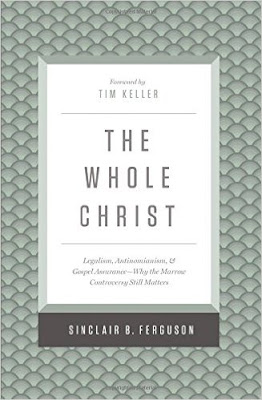Virtual Book Club: The Whole Christ (part 2 of 11)
 Ferguson opens chapter 2 by asking a fundamental question:
What is the gospel? "The extent to which the answer we give determines how
we preach and communicate the gospel." (565)
Ferguson opens chapter 2 by asking a fundamental question:
What is the gospel? "The extent to which the answer we give determines how
we preach and communicate the gospel." (565)
What had happened with the Scottish church in the 18th century was that it had
fallen into a legalistic pitfall of limiting the offer of Christ to those who
seemed eligible. They fell into an unbiblical version of Calvinism where the
offer of grace could only be genuinely given to someone who showed signs that
they were of the elect. This is unquestionably wrong. As Evangelista says in
the Marrow of Modern Divinity: "I beseech you, consider, that God the
Father, as he is in his Son Jesus Christ, moved with nothing but with his free
love to mankind lost, hath made a deed of gift and grant unto them all, that
whosoever shall believe in this his Son, shall not perish, but have eternal
life."
Ferguson then goes to show how this universal offer to all
does not go against the Westminster Confession's affirmation of limited
atonement or particular redemption (the doctrine that Jesus died for the elect
alone, and is perfect in its effect). For the record, I am not a big limited
atonement guy. I know that our atonement must be limited in some sense, because
we are not universalists, but I have trouble seeing how the plethora of texts
using the word "all" don't actually mean "all" but only
refer to those who will be saved. Anyways, Thomas Boston, while adamantly
affirming his church's Calvinism, stressed that this emphasis of the Marrow
preserved two of the great keynotes of the NT's message:
1. In Jesus Christ there is a fullness of grace for all who
will come to him.
2. In Jesus Christ there is not only fullness but also
freeness of that grace.
This freeness means that: "The offer of the gospel is
to be made not to the righteous or even the repentant, but to all. There are no
conditions that need to be met in order for the gospel offer to be made."
(614)
They key lesson to learn from this stumbling of the Scottish
church is: when we try to make perfect human sense of heavenly mysteries, when
we try to cram all of heaven’s truth into a fully comprehensive man made system, we can
often end up logically arriving at unbiblical conclusions. This is what
happened with their Calvinism. There is nothing wrong with Calvinism as a
robust theological system, but this system (a way we understand the Bible) had
developed a "deformed" or "hyper" logic of its own which
grew insensitive to the style and atmosphere of the New Testament. They
figured: "Because God only gives his saving grace to the elect alone, and
the elect are known by their forsaking sin, therefore the forsaking of sin is a
prerequisite for saving grace"(626). It is true that only the elect are
saved. It is true that the elect are known by forsaking sin. But it is dangerously
incorrect to make that fruit of salvation (forsaking sin) a prerequisite for
salvation.
The impetus is on us today to remain harshly Biblical in our
understanding and to be content leaving a degree of tension in the mysteries
Scripture does not clearly resolve.
The best part of this chapter in my opinion, however, was
when Sinclair dove a little deeper into the legalistic foundation of the
church: "Perhaps the most significant underlying issue was that the gospel
was being preached in a way that implied a separation between Christ and the
benefits of the gospel"(638).
According to Ferguson, a major issue with the Scottish
Church was exactly this: they were subtly separating the benefits of Christ
from Christ himself. They would say through Christ we achieve salvation,
fullness, and blessing (emphasis on the preposition "through"). They
would say it is by Jesus that we receive these benefits. While these are likely
statements that we would all affirm without thinking twice, what started to
happen was that Jesus became a secondary means to an end, instead of remaining
the end in Himself. They wanted Jesus, not because they wanted Jesus, but in
order that they would receive His blessings and marvelous benefits. This is
rarely a conscious shift in thinking, it is subtle--and not without
consequence.
For it only makes sense when we preach Christ's benefits,
people will naturally want those benefits. Now, it is not wrong to preach the
marvelous benefits Jesus brings (how can we not?!), but if they are “abstracted”
or seen as separate from Christ, people will respond to the gospel no longer by
saying: "How can I get Christ and be grafted into Him?" but instead:
"How can I get these incredible benefits into my life?" See what has
happened? Jesus has been removed from the forefront to the background. From the
primary focal point to the secondary.
Have you seen this tendency in modern evangelicalism?
Personally I have witnessed hundreds of baptisms and testimonies which are
always a joyous occasion. Always. Frequently however I will hear people say in
their testimonies something along the lines of: "I have made a lot of
mistakes in my life. I have made some bad decisions. I really want to turn my
life around and be the person God wants me to be. I want to get baptized today
to be obedient to the Lord and to show that I am serious honoring Him with my
life." And while I will celebrate this testimony and the work God has begun
in this individual's life, sometimes I will ask to myself: “where is Jesus?” It can seem that Jesus has become almost a periphery figure, lost in the fog of His
marvelous benefits that are so deeply desired.
Ferguson goes on to tell us that there is no separation
between Christ and His benefits. That it is, in effect, incorrect to say,
"Believe in Jesus and through Him you will receive joy, peace, blessing,
salvation, and adoption." Instead it is "believe in Jesus and IN
Jesus we will find true salvation and true blessing. Why? Because "Jesus
is the gospel." In Him is the fullness of the benefits he offers. So while
it seems "nitpicky" it is important that when we present this truth,
we must keep both the Savior and His benefits together.
Discussion:
I thought it was an interesting point when Ferguson said: “wherever the benefits of Christ are seen as abstractable
from Christ himself, there is a decreasing stress on his person and work in
preaching and in the books that are published to feed that preaching”(718). I do think this is more often than not the
case with the modern church.
I also found it interesting to learn that instead of
thinking of themselves as Christians, saints, believers, or disciples-- the
early Christians thought of themselves with a different label: "Contrast
these descriptors with the overwhelmingly dominant way the New Testament
describes believes. It is that we are 'in Christ.' The expression, in one form
or another, occurs well over one hundred times in Paul's thirteen letters"
(659). When we miss this idea of “union with Christ” we often
"abstract" the benefits of Christ from Christ, and therefore fall
into similar error as the Scottish church did hundreds of years ago.
This chapter was heavily theological and dense. But I think
it is good for readers, even those who come from a less reformed theological
background, to grapple with the nature of the atonement and election. Ferguson
comes from a heavily reformed perspective which is something I do not have much
of a problem with. The best parts of reformed theology is its high view of God
(and Scripture) and the subsequent limited view of man that results. Some of
the finer things like limited atonement, or a predominate emphasis on topics
like predestination, or even a lack of emphasis on the power of the Holy Spirit
in the Christian life--can be areas of criticism, but in the main these guys
are pretty solid. The sermons and writings of guys like: Martyn Lloyd-Jones,
James Boice, R. C. Sproul, even John Calvin himself have had profound influence
on my Christian life.
Questions:
1. While we may not struggle with hyper-Calvinism, what are
some other ways human logic can deteriorate Biblical truth?
2. Do you think it is a necessary point of emphasis to keep
Jesus and His benefits together? Why or why not?
3. How can we ensure that Jesus remains central in our
teaching and Christian life (1 Cor 2:2)--and does not become only a secondary means to some
other end?



Comments
Post a Comment